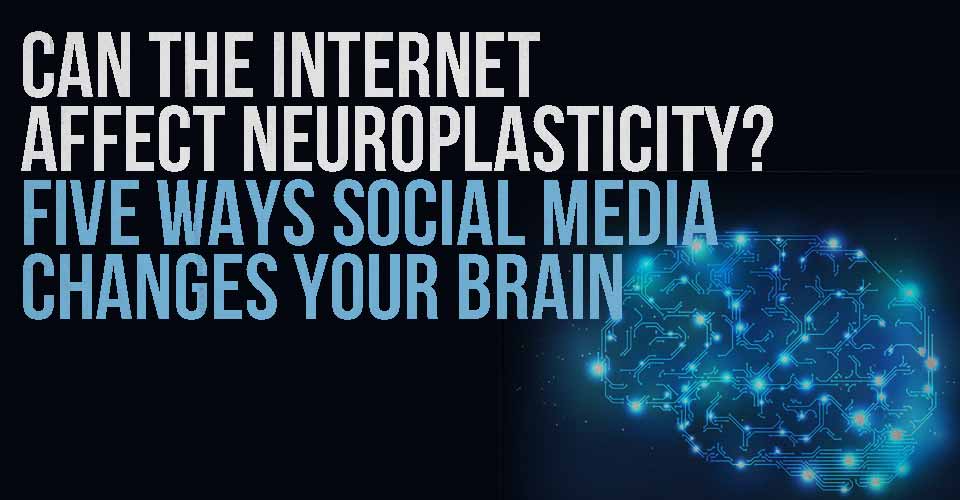Can The Internet Affect Neuroplasticity? Five Ways Social Media Changes Your Brain


Social media. Twenty years ago it was hardly a thing; now, it would seem, it is everything. At least to the one-third of the global population who use social media regularly: that’s approximately two and a half billion people. How did something that barely existed a mere two decades ago become so fundamentally integrated into our lives?!
Buy an “Intelligence is sexy” t-shirt!
Numerous studies on how social media affects the brain may suggest some excellent reasons for this widespread social overhaul. One of the primary indicators is that addiction to the Internet is actually a quickly-spreading global mental health concern. While it is a psychological addiction, brain scans of people using social media show impairment in the same regions as those affected by substance addiction. Addiction to the Internet may be psychological, but that it shows physiological indicators within the human brain is of distressing concern to mental health professionals around the world. It’s estimated that 5-10% of Internet users actually cannot stop their online use of their own accord.
Multi-tasking is another problematic indicator of social media’s interference with our brains. The prevailing notion that multi-taskers can get more done switching between work and websites needs to be shut down: multiple studies, such as this one, have shown that not only is the opposite true, but multi-tasking can actually be harmful to normal brain function. Multi-tasking actually lowers our ability to block out interference and, therefore, our capacity to concentrate on a single task. Furthermore, mounting evidence points to multi-tasking actually inhibiting memory function.
Another rather interesting trend that shows the definitive impact of social media on our brains is phantom vibration syndrome. While this might sound like a rejected title for the next Star Wars film, phantom vibration syndrome is a real, physiological reaction some people have when they think their phone is vibrating…but it isn’t. Phantom vibration syndrome demonstrates our bodies’ rapid assimilation of a trigger that isn’t even actually there. Phantom vibration syndrome, not surprisingly, occurs commonly among young adults.
One of the greatest indicators of social media’s interference in our brains, though, is the measurable increase in the release of dopamine by our brains in response to social media stimulation. Social media creates an almost entirely ego-centric culture, and everything about the culture just continues to feed it. In conversations with other people, we are likely to talk about ourselves 30-40% of the time, whereas when we’re using social media websites that number jumps to 80%. Add in constant stimulation in the form of “likes”, “followers”, “shares”, “comments” and the dopamine just keeps increasing until we’re drowning in a sea of feel-good hormones generated entirely by our egocentric Internet culture.
It’s not all bad news, though: one surprising way that social media has been found to actually foster better relationships between humans is within intimate partnerships. Partners who met online before they met in real life statistically have a better chance of a successful relationship. Theories abound as to why and probably it has something to do with the comfort of controlled anonymity and the ability to set expectations more realistically -and without the involvement of your pitter-pattering heart as you gaze into your blind date-turned-possible-future-partner’s eyes. Rather interesting, isn’t it, that given all the ways social media tends to distance us from each other, the most important relationships of our lives can actually be more effectively fostered through Internet connections. (See what I did there?)
Read: This Video Shows How Social Media Is Killing Your Relationship
It would certainly seem that social media is going to be part of our lives for awhile, and the recent trend of some celebrities dumping their Instagram and Twitter and Facebook accounts is rather interesting to watch evolve. We’re betting that while they might miss the constant feeding of their egos, they’re probably enjoying the respite to catch up with some of the people in their lives outside of themselves. Certainly, this seems to be a trend we can admire…in our posts, and our tweets, and our #hashtags.

